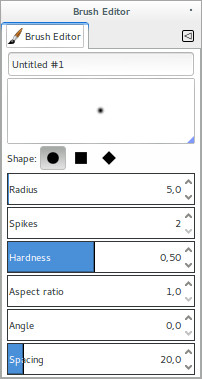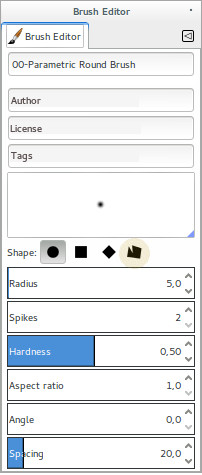Difference between revisions of "Parametric-brushes"
(→Contextual Menu of Vector Brush Editor) |
|||
| Line 12: | Line 12: | ||
Add fields to Author, License, Tags and Comments (The Figure does not present the 'Comments' field, I will update it soon). | Add fields to Author, License, Tags and Comments (The Figure does not present the 'Comments' field, I will update it soon). | ||
| − | + | ====Contextual Menu - Brushes==== | |
| − | |||
Use the two levels in a way to organize the tasks between creation and interaction to edit, duplicate and delete them. | Use the two levels in a way to organize the tasks between creation and interaction to edit, duplicate and delete them. | ||
| − | |||
| − | |||
| − | |||
'''First Level''' | '''First Level''' | ||
| − | Brushes Menu [1] | + | Brushes Menu [1] > |
| − | Parametric... | + | Parametric... [2] |
| − | Elliptic Feathery... | + | Elliptic Feathery... [3] |
| − | Elliptical... | + | Elliptical... [3] |
| − | Rectangular Feathery... | + | Rectangular Feathery... [3] |
| − | Rectangular... | + | Rectangular... [3] |
| − | Custom Brush... | + | Custom Brush... [4] |
| − | Messages and Scripts | + | =====Messages and Scripts===== |
| − | In each message box of [2] and [3] options, when we have mouseover, we need to write or repeat the kind of brush that will be created, for instance: | + | In each message box of [2] and [3] options, when we have mouseover, we need to write or repeat the kind of brush that will be created, for instance:<br> |
| − | [2] To parametric kind, "Create .vbr parametric brush." | + | [2] To parametric kind, "Create .vbr parametric brush."<br> |
| − | [3] To raster kind, an example, instead in Elliptical, Feathered... "Create an elliptical brush with feathered edges" > "Create a .gbr raster elliptic brush with feathered edges. " | + | [3] To raster kind, an example, instead in Elliptical, Feathered... "Create an elliptical brush with feathered edges" > "Create a .gbr raster elliptic brush with feathered edges." |
| − | To dialogue of windows of the scripts, we need to identify the kind of brush that we are creating, raster or parametric. | + | To dialogue of windows of the scripts, we need to identify the kind of brush that we are creating, raster or parametric.<br> |
| − | [4] To Custom Brush, we need to create a new script to create custom raster brushes. IMO, this script must be capable of creating an empty .xcf archive with a feature to set the size layer, the layer number, if is grayscale or RGB, transparent or white background. | + | [4] To Custom Brush, we need to create a new script to create custom raster brushes. IMO, this script must be capable of creating an empty .xcf archive with a feature to set the size layer, the layer number, if is grayscale or RGB, transparent or white background.<br> |
The message of the 'mouseover' option could be: "Create a custom raster brush." | The message of the 'mouseover' option could be: "Create a custom raster brush." | ||
| − | + | '''Second Level''' | |
| − | Second Level | + | Brushes Menu [1] > |
| − | Brushes Menu [1] | + | \_Edit Brush [5] |
| − | + | \_Duplicate Brush | |
| − | + | --- | |
| − | + | \_Copy Brush Location | |
| − | + | \_Show in File Manager | |
| − | + | \_Delete Brush | |
| − | + | --- | |
| − | + | Refresh Brushes | |
| − | |||
[5] a conditional option: if is parametric send it to Parametric Editor, if is raster open the archive as an image. | [5] a conditional option: if is parametric send it to Parametric Editor, if is raster open the archive as an image. | ||
| − | The ideal naming of the second-level options is to have the name of asset in the each voice, for instance: | + | The ideal naming of the second-level options is to have the name of asset in the each voice, for instance:</br> |
| − | instead to have a simple '\_Edit Brush' to have \_Edit 'Brush Name #1' | + | instead to have a simple '\_Edit Brush' to have \_Edit 'Brush Name #1'</br> |
In this way, we can avoid making wrong choices. | In this way, we can avoid making wrong choices. | ||
===Contextual Menu of Vector Brush on Dialog lists=== | ===Contextual Menu of Vector Brush on Dialog lists=== | ||
See [[http://gui.gimp.org/index.php/Brush-assets#Contextual_Menu_and_Brushes_Menu_.7C_Raster_and_Parametric_on_the_Dialog_lists Contextual Menu and Vector Brush Instances]] | See [[http://gui.gimp.org/index.php/Brush-assets#Contextual_Menu_and_Brushes_Menu_.7C_Raster_and_Parametric_on_the_Dialog_lists Contextual Menu and Vector Brush Instances]] | ||
Revision as of 19:20, 2 March 2024
Contents
Parametric Brushes
Current Editor
Editor with irregular polygon shape and additional fields
Additional Irregular Polygon Shape
Add the shape of an irregular polygon into the settings of parametric brushes linked to a Library. The Library of the polygons could be in .svg following a precise format (dimension and colour). Another idea could be to use the Path Tool to create a small library to use in this editor as an irregular shape.
The button irregular polygon imports these shapes on the editor where is possible to modify radius, hardness, aspect ratio and spacing.
Additional Fields
Add fields to Author, License, Tags and Comments (The Figure does not present the 'Comments' field, I will update it soon).
Contextual Menu - Brushes
Use the two levels in a way to organize the tasks between creation and interaction to edit, duplicate and delete them. First Level
Brushes Menu [1] > Parametric... [2] Elliptic Feathery... [3] Elliptical... [3] Rectangular Feathery... [3] Rectangular... [3] Custom Brush... [4]
Messages and Scripts
In each message box of [2] and [3] options, when we have mouseover, we need to write or repeat the kind of brush that will be created, for instance:
[2] To parametric kind, "Create .vbr parametric brush."
[3] To raster kind, an example, instead in Elliptical, Feathered... "Create an elliptical brush with feathered edges" > "Create a .gbr raster elliptic brush with feathered edges."
To dialogue of windows of the scripts, we need to identify the kind of brush that we are creating, raster or parametric.
[4] To Custom Brush, we need to create a new script to create custom raster brushes. IMO, this script must be capable of creating an empty .xcf archive with a feature to set the size layer, the layer number, if is grayscale or RGB, transparent or white background.
The message of the 'mouseover' option could be: "Create a custom raster brush."
Second Level
Brushes Menu [1] >
\_Edit Brush [5]
\_Duplicate Brush
---
\_Copy Brush Location
\_Show in File Manager
\_Delete Brush
---
Refresh Brushes
[5] a conditional option: if is parametric send it to Parametric Editor, if is raster open the archive as an image.
The ideal naming of the second-level options is to have the name of asset in the each voice, for instance:</br> instead to have a simple '\_Edit Brush' to have \_Edit 'Brush Name #1'</br> In this way, we can avoid making wrong choices.

